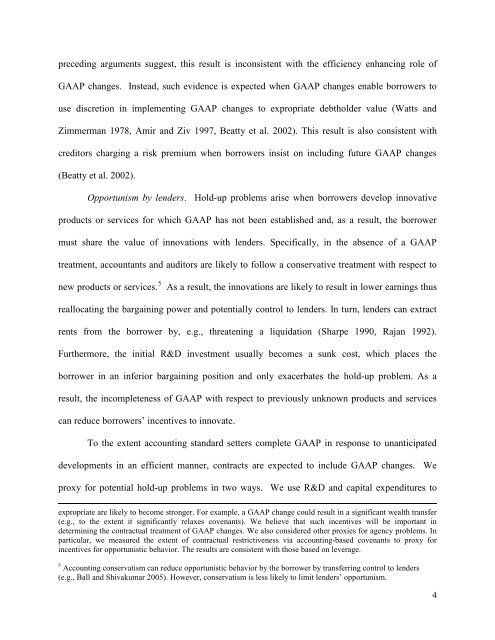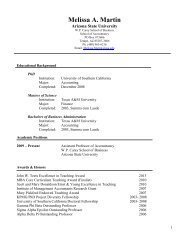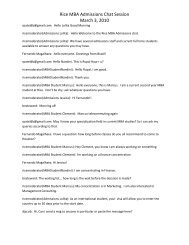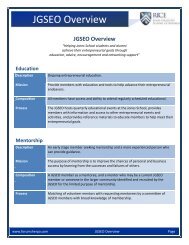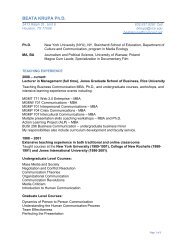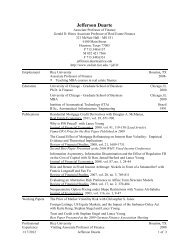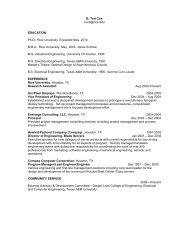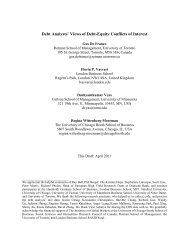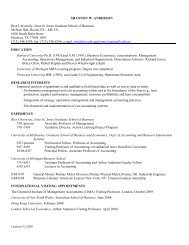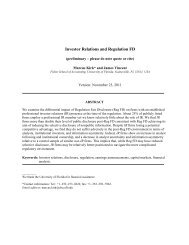Debt Contracts and the Need for Mandatory Accounting Changes ...
Debt Contracts and the Need for Mandatory Accounting Changes ...
Debt Contracts and the Need for Mandatory Accounting Changes ...
You also want an ePaper? Increase the reach of your titles
YUMPU automatically turns print PDFs into web optimized ePapers that Google loves.
preceding arguments suggest, this result is inconsistent with <strong>the</strong> efficiency enhancing role of<br />
GAAP changes. Instead, such evidence is expected when GAAP changes enable borrowers to<br />
use discretion in implementing GAAP changes to expropriate debtholder value (Watts <strong>and</strong><br />
Zimmerman 1978, Amir <strong>and</strong> Ziv 1997, Beatty et al. 2002). This result is also consistent with<br />
creditors charging a risk premium when borrowers insist on including future GAAP changes<br />
(Beatty et al. 2002).<br />
Opportunism by lenders. Hold-up problems arise when borrowers develop innovative<br />
products or services <strong>for</strong> which GAAP has not been established <strong>and</strong>, as a result, <strong>the</strong> borrower<br />
must share <strong>the</strong> value of innovations with lenders. Specifically, in <strong>the</strong> absence of a GAAP<br />
treatment, accountants <strong>and</strong> auditors are likely to follow a conservative treatment with respect to<br />
new products or services. 5 As a result, <strong>the</strong> innovations are likely to result in lower earnings thus<br />
reallocating <strong>the</strong> bargaining power <strong>and</strong> potentially control to lenders. In turn, lenders can extract<br />
rents from <strong>the</strong> borrower by, e.g., threatening a liquidation (Sharpe 1990, Rajan 1992).<br />
Fur<strong>the</strong>rmore, <strong>the</strong> initial R&D investment usually becomes a sunk cost, which places <strong>the</strong><br />
borrower in an inferior bargaining position <strong>and</strong> only exacerbates <strong>the</strong> hold-up problem. As a<br />
result, <strong>the</strong> incompleteness of GAAP with respect to previously unknown products <strong>and</strong> services<br />
can reduce borrowers’ incentives to innovate.<br />
To <strong>the</strong> extent accounting st<strong>and</strong>ard setters complete GAAP in response to unanticipated<br />
developments in an efficient manner, contracts are expected to include GAAP changes. We<br />
proxy <strong>for</strong> potential hold-up problems in two ways. We use R&D <strong>and</strong> capital expenditures to<br />
expropriate are likely to become stronger. For example, a GAAP change could result in a significant wealth transfer<br />
(e.g., to <strong>the</strong> extent it significantly relaxes covenants). We believe that such incentives will be important in<br />
determining <strong>the</strong> contractual treatment of GAAP changes. We also considered o<strong>the</strong>r proxies <strong>for</strong> agency problems. In<br />
particular, we measured <strong>the</strong> extent of contractual restrictiveness via accounting-based covenants to proxy <strong>for</strong><br />
incentives <strong>for</strong> opportunistic behavior. The results are consistent with those based on leverage.<br />
5 <strong>Accounting</strong> conservatism can reduce opportunistic behavior by <strong>the</strong> borrower by transferring control to lenders<br />
(e.g., Ball <strong>and</strong> Shivakumar 2005). However, conservatism is less likely to limit lenders’ opportunism.<br />
4


